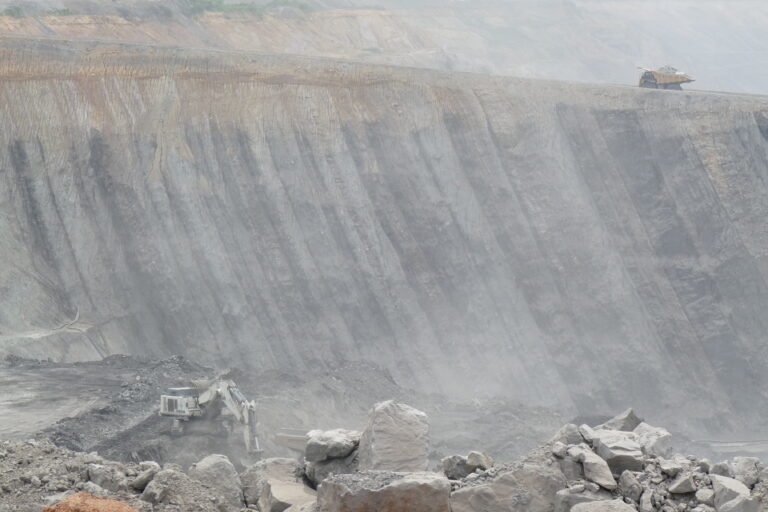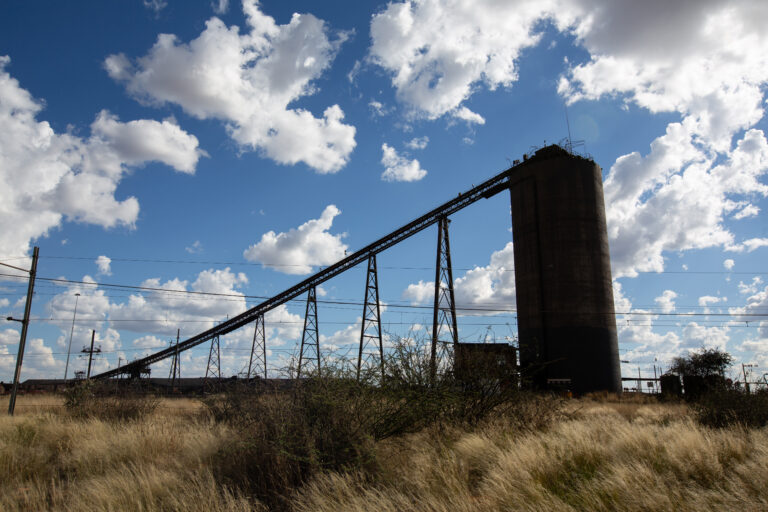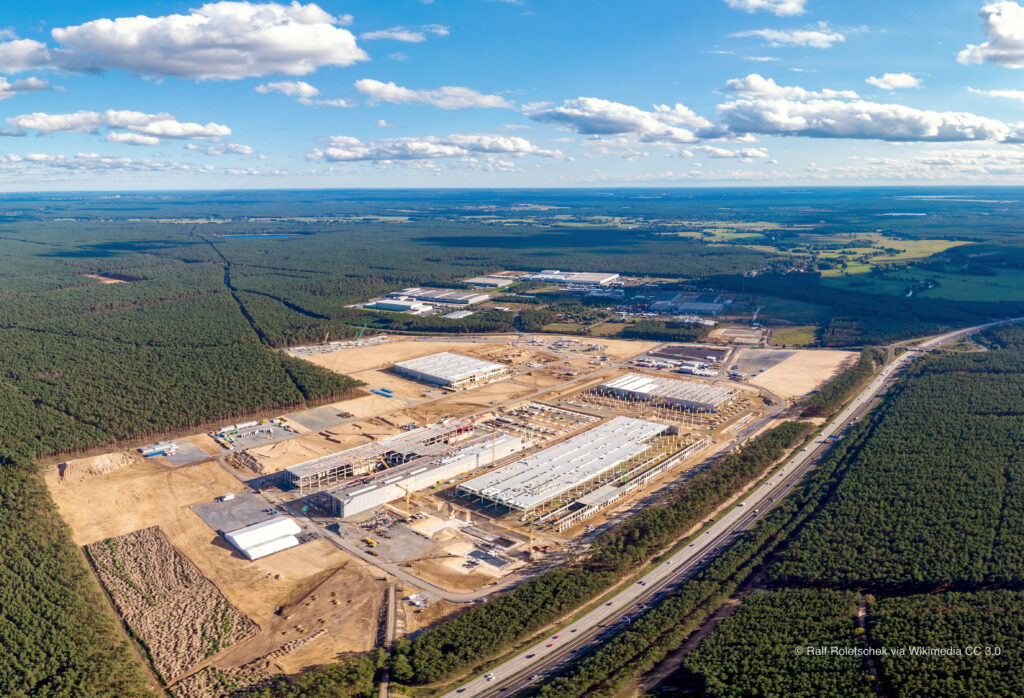Critical minerals, renewable energy and extractivism
The global energy system is unsustainable and revolves around the interests of large corporations and financiers. The current transition narratives focused on decarbonisation continue to hide global power imbalances and inequalities.
Our work at SOMO makes links between the social, economic, and environmental struggles of workers and communities in low-income countries; the behaviour of multinational power companies and their financiers; and the international and regional agreements that underpin the energy system and the governance of critical minerals.
Shifting from fossil fuels to renewables is vital when it comes to tackling the climate emergency. However, the proposed energy transition is not seeking to reduce unsustainable energy production or consumption. As a result, global power imbalances and historical inequalities are being hidden under the transition narratives that are primarily focused on decarbonisation.
Low-carbon technologies rely heavily on resource extraction, placing critical minerals at the core of the global political agenda and geopolitics. For example, lithium-ion batteries in electric vehicles require mineral extraction like lithium, cobalt, nickel, graphite, and manganese.
The increasing demand for these minerals is leading to a surge in mining activities. Putting business objectives, such as profit maximisation and shareholder value, above the well-being of people and the planet is resulting in negative socioeconomic and environmental impacts. Producing countries, particularly communities in the Global South, are once again paying the highest price.
Through our research and advocacy, we are calling for a transition to a more sustainable and democratic global energy system and management of natural resources that puts people and the planet above profits.
Highlighted Publications
-
Posted in category:Publication

-
Manganese matters Published on:
 Alejandro GonzálezPosted in category:Publication
Alejandro GonzálezPosted in category:Publication Alejandro González
Alejandro González
-
Wood pellet damage Published on:
 Sanne van der WalPosted in category:Publication
Sanne van der WalPosted in category:Publication Sanne van der Wal
Sanne van der Wal
Decarbonisation still depends on extracting critical minerals
The reliance on fossil fuels and mineral extraction for energy production is deeply ingrained in our modern industrialised societies. While recent years have seen a focus on transitioning away from fossil fuels and towards cleaner, renewable energy sources to address the climate crisis, mineral extraction remains at the core of energy production. The quest for critical minerals by the world’s powers is booming, putting evermore pressure on communities and the environment. The shift from fossil fuels to renewable energy involves decarbonising our energy systems by adopting low-carbon technologies, which in turn require intensive extractive activities of minerals.
Electric vehicles are often presented as the ultimate decarbonisation solution to help reduce emissions from road transport. But the increasing need for minerals to produce the batteries propelling these vehicles increases pressure on communities around the world. Argentina, Bolivia, and Chile hold three-quarters of the world’s lithium resources, while the Democratic Republic of Congo produces about two-thirds of the world’s cobalt. Some communities in these countries face heavy pollution, water scarcity, exposure to toxins, dangerous mining conditions and child labour, which risks being exacerbated by the mineral boom.
Governments from the Global North often promote the energy transition as an economic growth strategy and are striving to create a conducive environment for multinational corporations to invest in renewable energy projects. But multinational corporations are driven by their profit-making objectives. Their interest in the opportunities presented by the energy transition, particularly in expanding renewable energy technologies, depends heavily on large-scale extractivist operations. Therefore, decarbonisation carries the same negative impacts on socioeconomic and environmental aspects as traditional fuel extraction.
While government support can be crucial in driving clean energy adoption, we believe policies and regulations must be put in place to ensure responsible practices, social inclusivity, and environmental protection. Proper safeguards and accountability mechanisms are crucial to make sure that multinational corporations adhere to sustainable practices.
How the electric vehicle boom is draining communities and the planet
The unprecedented increase in demand for the raw materials needed to produce the batteries to propel electric vehicles poses serious human rights and environmental risks and begs the question how sustainable and fair a mobility transition based on the mass uptake of electric vehicles really is.

Decarbonisation needs to meet consumption reduction
Energy consumption is linked to various environmental, social, and economic sustainability issues beyond carbon emissions. It impacts water resources, air quality, waste generation, biodiversity, and human health. Focusing solely on decarbonisation without addressing energy consumption overlooks and, in some cases, amplifies these broader sustainability concerns.
Advocating for decarbonisation without questioning the fundamental capitalist notion of pursuing “growth at all costs” further reinforces the harmful belief that specific individuals and communities can be sacrificed for the benefit of industrialised countries and multinationals. This approach primarily caters to the energy demands of the Global North and its corporate entities while disregarding the severe adverse effects borne by the Global South, including peasant communities and Indigenous people, whose struggles often go unnoticed and unaddressed.
We are calling for a comprehensive approach from the global energy system to promote a sustainable and fair energy future. This approach should prioritise decarbonisation and energy efficiency measures that reduce unsustainable energy and mineral consumption, while transitioning to low-carbon or renewable energy sources.

Challenging a corporate-led energy transition in the global energy system
The relentless pursuit of shareholder value poses a significant obstacle in addressing the climate emergency. Embracing a corporate-led energy transition focused on profit and growth exacerbates existing inequalities rooted in colonial legacies, and perpetuates the exploitation of nature. This corporate-led energy transition fails to make a critical assessment of the feasibility and fairness of alternative, regenerative, and democratic energy systems.
The predominant approach adopted by international oil, coal, and gas companies when navigating the energy transition is the single-minded goal of “maximising shareholder value”.
To give just one example: During the 2023 Shell Annual General Meeting (AGM), the newly appointed CEO Wael Sawan and the Board communicated that renewable energy ventures need to generate more profits to increase shareholder value. Rather than adhering to their commitment to reduce oil production by 1-2 percent annually, the current management at Shell emphasised that fossil fuels will once again become the central focus of their business and investments. This is because renewables were deemed to be insufficiently profitable.
Corporate accountability and responsible disengagement
If we want to avert catastrophic climate change, mining and energy companies must cease extracting and burning fossil fuels. However, this transition raises crucial questions about the impact on communities and workers who rely on these extractive industries for their livelihoods. Additionally, the departure of mining and energy companies leaves unresolved issues concerning the victims of human rights abuses and environmental damage caused by past extraction activities that have yet to receive adequate remediation.
The topic of responsible disengagement is a recurring concern in our work and is expected to become even more significant in light of the energy transition. At SOMO, we are working alongside affected communities and partners globally to actively develop solutions. Our efforts urge companies and governments to acknowledge the need to disengage responsibly and to integrate these practices into corporate frameworks for human rights and environmental due diligence.
Through these endeavours, we are seeking to address the complex challenges arising from the energy transition while ensuring the well-being of affected communities, at the same time as safeguarding human rights and the environment.
-
Responsible disengagement from coal (pdf, 1.13 MB)
Troubling trends in challenging climate policies
Against the backdrop of geopolitical competition, governments from the Global North are pushing for free trade and investment agreements with resource-rich countries in the Global South to diversify and secure their supply of energy and raw materials. These agreements incorporate legally binding provisions that affect the capacities of trade partners to pursue developmental and industrialisation strategies, for example, through down streaming and local value-adding activities. Subsequently, they set out to reinforce asymmetric trade patterns with countries in the Global South remaining mere exporters of unprocessed energy and raw materials for industrial production in the Global North.
Moreover, numerous agreements incorporate Investor-State Dispute Settlement (ISDS) mechanisms. ISDS grants transnational corporations and their shareholders the possibility to take legal action against governments through secretive tribunals outside the national legal system, specifically concerning changes in law and policies, including those in the public interest, that could potentially diminish their profits.
Over the years, oil, gas, mining, extractive, and energy corporations have initiated hundreds of ISDS cases against various countries. In recent times, there has been a noticeable rise in cases that are directly challenging climate policies, which is a deeply troubling trend.
We must eliminate the ISDS system urgently. The undeniable proof of extensive harm to the global environment, lands, health, and the autonomy of nations emphasizes the critical nature of this issue. The heightened importance of addressing climate concerns is indisputable.
The suggestions for reform are feeble, lacking impact, and fall significantly short of the required measures. Our work and research at SOMO aims to encourage governments to take immediate action to put an end to the risks of ISDS.
Do you need more information?
-

Ilona Hartlief
Researcher -

Bart-Jaap Verbeek
Researcher
Latest updates
-
 Dutch court dismisses damage claims by RWE and UniperPosted in category:News
Dutch court dismisses damage claims by RWE and UniperPosted in category:News Bart-Jaap VerbeekPublished on:
Bart-Jaap VerbeekPublished on: -
 Electric vehicles are a good thing – but not if everybody owns onePosted in category:News
Electric vehicles are a good thing – but not if everybody owns onePosted in category:News Alejandro GonzálezPublished on:
Alejandro GonzálezPublished on: -
 The Netherlands wants to exit Energy Charter TreatyPosted in category:News
The Netherlands wants to exit Energy Charter TreatyPosted in category:News Bart-Jaap VerbeekPublished on:
Bart-Jaap VerbeekPublished on:
Related Topics
Discover more of SOMO’s work and publications.






